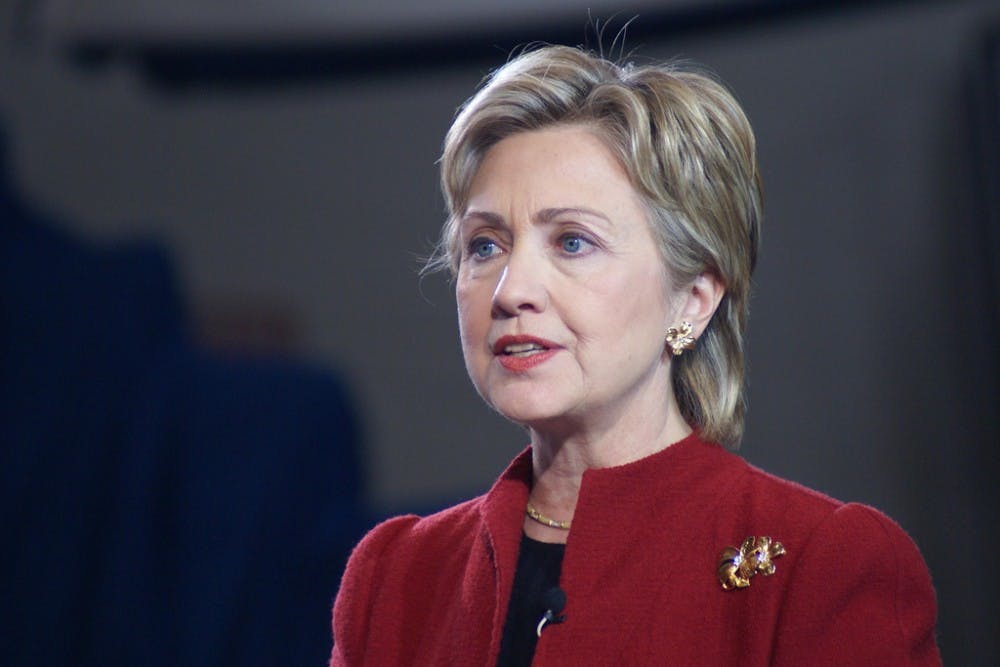Although Duke professors and students said the Democratic National Convention went well, they noted the Party has work to do if it wants to win in November.
The convention in Philadelphia saw the official nomination of the Hillary Clinton-Tim Kaine presidential ticket. Key endorsements for Clinton came from speakers including primary rival Sen. Bernie Sanders, President Barack Obama, First Lady Michelle Obama and former President Bill Clinton.
“It went very well—about as well as it possibly could,” said Pope McCorkle, associate professor of the practice in the Sanford School of Public Policy. “In terms of the traditional political metrics we use, you would think that Clinton would have a decisive advantage.”
At the same time, the event also saw its share of controversy. Emails from key Democratic National Committee employees, released by WikiLeaks, suggested that the party supported Clinton over Sanders in the primary. Chairwoman Debbie Wasserman Schultz resigned following the leak.
“The scandal likely would have entirely derailed any other candidate in virtually any other election cycle,” wrote freshman Miles Burnette, a Democrat who supports Clinton, in an email. “However, I think the extraordinary circumstances of this election will keep this scandal from crippling Clinton.”
Sanders vs. Clinton
Although many protesters were in attendance to oppose Clinton's nomination, Sanders delivered a speech emphasizing the need for party unity in order to defeat Republican candidate Donald Trump. In doing so, McCorkle said, Sanders "moved to a new level of being the wise elder statesman."
Burnette noted there is still animosity within the party however, despite Sanders' remarks.
“Overall I think this race has hurt the Democratic Party because it not only brought strong divisions to the forefront," Burnette wrote. "Many of the primaries, and the issues surrounding the Democratic National Committee as a whole, validated the feelings of disenfranchisement and unfairness that many Sanders supporters felt throughout the process."
McCorkle also explained that Clinton could have done more to directly address the American people in order to establish trust with the public.
“It’s very hard once people don’t trust you to do something or say something yourself,” he said. “So surrogates there can be helpful. There were a number of people from very impressive walks of life who were saying that.”
The tight race between Sanders and Clinton during the primaries illuminated Clinton’s drawbacks, including her positions on trade, McCorkle said.
Sophomore Ahmed Mohamed, a Democrat, similarly noted that some Sanders' supporters are not sold on how progressive Clinton's platform is.
“Political reform is an important issue that our country faces, but I do feel it also falls second to a Trump,” Mohamed said.
A historic moment
The event also marked the first time in American history a female candidate won a major party's presidential nomination.
“I found the convention really galvanizing and seeing a major party choose a woman as their nominee for the first time was tremendously moving,” wrote Charlotte Sussman, associate professor of English, in an email.
Sussman compared Clinton’s nomination to how women are portrayed in eighteenth century literature such as "Pride and Prejudice," saying Clinton accomplished “great things after marriage and motherhood.”
“We will see how much of a fact that she is the first woman candidate sinks into people and give them a positive to counteract the concern of her as a politician,” McCorkle said.
Voter turnout
Clinton will also have to work to achieve voter turnout, Mohamed argued.
“She lacks the charm that Obama or her husband had," he said. "Some African-American and Latino voters that came out for Obama are certainly not coming out for her."
The convention had a diverse list of speakers. Sen. Elizabeth Warren and former New York City Mayor Michael Bloomberg spoke, as did the "Mothers of the Movement," a group of African-American women who lost their children to gun violence or law enforcement. Several Republican speakers also endorsed Clinton, in an attempt to appeal more conservative voters.
“I think Clinton did a lot to win over voters outside of the traditional Democratic base, but more through reaching out to center and center-left independents, as well as some Republicans, than by winning over die-hard Sanders supporters,” Burnette wrote.
Trump's rhetoric on the campaign trail will also help get people to the polls, several noted.
McCorkle said that Clinton's supporters will have to emphasize that Trump is "just simply too scary and unacceptable for anybody."
Mohamed agreed that Trump's words could turn off voters.
“The more and more Trump does interviews, voices his opinions and gets called out on his fear-mongering and divisive rhetoric, people will start to see it’s not worth him being in power," he said.
Get The Chronicle straight to your inbox
Signup for our weekly newsletter. Cancel at any time.

